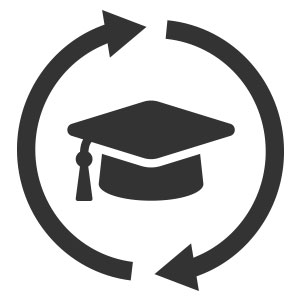Committed to working in a helping profession? Want to aid others in such fields as mental health, developmental disabilities and addiction? Our Human Services associate degree program opens doors to such opportunities as intake work, crisis intervention, consumer advocacy, residential counseling and more.
Depending upon your interests, you may pursue a concentration in Addictions, Gerontology or Children, Youth and Family Services.
Human Services courses are offered through accelerated, online, hybrid and traditional classroom formats. The Human Services Program is a career program designed for easy transfer to local colleges and universities for bachelor’s and/or master’s degree programs.
Program outcomes
- Demonstrate the knowledge and skills needed to work in direct service delivery in human service agencies and programs;
- Illustrate a clear understanding of human behavior in all age groups;
- Explain and apply appropriate skills necessary for a micro/macro perspective in human service delivery systems;
- Assess and summarize concepts of psychological and sociological theories necessary for intervention techniques.
Explore Careers
Program Curriculum
General Education Requirements
| Course ID | Title | Credits |
|---|---|---|
| ENG 101 | English Composition II,W | 3 |
| ENG 102 | English Composition III,W | 3 |
| Elective | Quantitative Reasoning | 3 |
| Elective | Aesthetic Sensibility | 3 |
| Elective | Scientific Reasoning | 4 |
Major Requirements
| Course ID | Title | Credits |
|---|---|---|
| HSW 101 | Introduction to Human ServicesO | 3 |
| HSW 102 | Theories of Group CounselingO | 3 |
| HSW 105 or SOC 105 | Social Policy and Ethics in Human ServicesE,I | 3 |
| HSW 130 or HSW 155 | Introduction to Youth and Family or Introduction to Aging | 3 |
| HSW-160, PSY 217, HSW 216 or HSW 254 | The Middle Years, Drug-Use and Abuse, Assessment Techniques for Child/Youth or Aging in the U.S. | 3 |
| HSW 202 | Theories of Individual Counseling | 3 |
| HSW 203 or PSY 203 | Assessment and Documentation in Human ServicesI | 3 |
| HSW 205 | Volunteer Administration | 3 |
| HSW 206, HSW 220, PSY 217 or PSY 206 | Hospice, Introduction to Adjunctive Therapies, Drug-Use and Abuse or Lifespan Development | 3 |
| HSW 210 | Professional Development in Human ServicesT | 3 |
| HSW 211 | Human Services Practicum | 6 |
| HSW 220, HSW 250 or HSW 219 | Introduction to Adjunctive Therapies, Psychology of Aging or Drug and Alcohol Treatment Process | 3 |
| PSY 101 | Introduction to Psychology | 3 |
| PSY 215 | Abnormal Psychology | 3 |
| SOC 101 | Introduction to SociologyC | 3 |
Full-time sample course schedule
Semester 1
| Course ID | Title | Credits |
|---|---|---|
| ENG 101 | English Composition I | 3 |
| PSY 101 | Introduction to Psychology | 3 |
| SOC 101 | Introduction to Sociology | 3 |
| HSW 101 | Introduction to Human Services and Helping Profession | 3 |
| HSW 130 | Introduction to Youth and Family | 3 |
Semester 2
| Course ID | Title | Credits |
|---|---|---|
| ENG 102 | English Composition II | 3 |
| HSW/PSY-203 | Assessment and Documentation in Human Services | 3 |
| HSW 102 | Theories of Group Counseling | 3 |
| HSW/SOC-105 | Social Policy and Ethics in Human Services | 3 |
| Elective | Quantitative Reasoning | 3 |
| HSW 254 | Aging in the United States | 3 |
Semester 3
| Course ID | Title | Credits |
|---|---|---|
| HSW 202 | Theories of Individual Counseling | 3 |
| HSW 205 | Volunteer Administration | 3 |
| HSW 210 | Professional Development in Human Services | 3 |
| PSY 206 | Lifespan Development | 3 |
| HSW 219 | Drug and Alcohol Treatment Process | 3 |
Semester 4
| Course ID | Title | Credits |
|---|---|---|
| HSW 211 | Human Services Practicum | 6 |
| PSY 215 | Abnormal Psychology | 3 |
| Elective | Aesthetic Sensibility | 3 |
| Elective | Scientific Reasoning | 4 |
Part-time sample course schedule
Semester 1
| Course ID | Title | Credits |
|---|---|---|
| HSW 101 | Introduction to Human Services and Helping Profession | 3 |
| ENG 101 | English Composition I | 3 |
Semester 2
| Course ID | Title | Credits |
|---|---|---|
| HSW 102 | Theories of Group Counseling | 3 |
| ENG 102 | English Composition II | 3 |
| SOC 101 | Introduction to Sociology | 3 |
Semester 3
| Course ID | Title | Credits |
|---|---|---|
| HSW/SOC-105 | Social Policy and Ethics in Human Services | 3 |
| Elective | Quantitative Reasoning | 3 |
Semester 4
| Course ID | Title | Credits |
|---|---|---|
| HSW 130 | Introduction to Youth and Family | 3 |
| PSY 101 | Introduction to Psychology | 3 |
| HSW/PSY-203 | Assessment and Documentation in Human Services | 3 |
Semester 5
| Course ID | Title | Credits |
|---|---|---|
| HSW 210 | Professional Development in Human Services | 3 |
| HSW 254 | Aging in the United States | 3 |
| PSY 206 | Lifespan Development | 3 |
Semester 6
| Course ID | Title | Credits |
|---|---|---|
| HSW 202 | Theories of Individual Counseling | 3 |
| Elective | Scientific Reasoning | 4 |
Semester 7
| Course ID | Title | Credits |
|---|---|---|
| HSW 219 | Drug and Alcohol Treatment Process | 3 |
| HSW 205 | Volunteer Administration | 3 |
Semester 8
| Course ID | Title | Credits |
|---|---|---|
| HSW 211 | Human Services Practicum | 6 |
Semester 9
| Course ID | Title | Credits |
|---|---|---|
| Elective | Aesthetic Sensibility | 3 |
| PSY 215 | Abnormal Psychology | 3 |
1 Students in Gerontology should take HSW 155. Other students should take HSW 130.
2 Students in Addictions should take HSW 160 or PSY 217. Students in Child, Youth & Family Services should take HSW 216. Other students should take HSW 254.
3 Students in Gerontology should take HSW 206. Students in Addictions should take HSW 220. Students in Child, Youth & Family Services should take PSY 217. Other students should take PSY 217.
4 Students in Child, Youth & Family Services should take HSW 220. Students in Gerontology should take HSW 250. Other students should take HSW 219.


